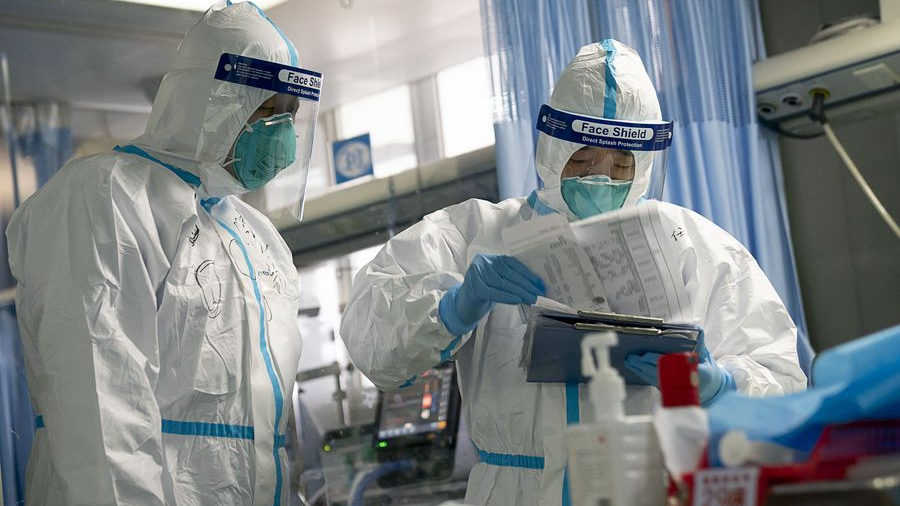With arduous efforts, a united country came through virus battle


The year 2020 is an unusual one for China, and for my career as a journalist. Since the beginning of the year, the novel coronavirus outbreak, which at first seemed to be just another unexceptional disease outbreak, quickly expanded in Wuhan, capital of Hubei province, and is still rampant across the globe.
With arduous efforts of the whole country, including the temporary sacrifice of freedom of movement of hundreds of millions of people and great losses to the economy, the epidemic has been largely brought under control in China, with the number of new cases reported daily falling to single digits or even zero.
Despite that, most residents, in Beijing at least, are still observing social distancing measures and wearing masks, and it is no exception at the Beijing Conference Center, one of the residential sites for meetings of national political advisers during the ongoing annual two sessions. Almost all members of the National Committee of the Chinese People's Political Consultative Conference wear a mask during meetings at the site.
As expected, the COVID-19 outbreak has been a hot topic among national political advisers in the past few days, and many of them have proposed to learn from the lessons in fighting the pandemic.
Despite great achievement in containing the coronavirus, the outbreak has exposed some gaps in China's public health system, including emergency management over major public health incidents, officials and experts have pointed out.
Before the opening of the two sessions, some CPPCC members who are also doctors and public health scholars had taken part in guiding COVID-19 control in Wuhan, and had already proposed improvements to China's public health systems, so that the country could better cope with outbreaks of major infectious diseases.

During discussions in meetings over the past few days, some members also gave suggestions on how to reform the disease prevention and control system.
Dong Xiaoping, a national political adviser and director for global public health center under the Chinese Center for Disease Control and Prevention, urged that more importance be given to disease prevention, including talent cultivation, rather than disease treatment. Meanwhile, the China CDC should be given some administrative power, so it can play a better role during major epidemics.
Zhu Tongyu, a CPPCC member and also director of the Shanghai Public Health Clinic Center, suggested an emergency medicine center be built in all major cities with a population of more than 10 million. Every center can serve as a major hospital in each city but can be quickly transformed to a designated hospital with 5,000 beds in case of major public health emergencies, which provides a buffer for regular hospitals to cope with emergencies.
Recalling the most difficult time back in late January and early February, some CPPCC members from Hubei province became emotional when making speeches at meetings.
"We fully thank the medical team from Shanghai and people of Shanghai for their help," Ma Jun, vice-president of Hubei University of Chinese Medicine, said at a meeting on Friday.
Shanghai was among the first provincial regions in China to send medical teams to Wuhan, the hardest hit Chinese city, to aid patients.
"On the eve of the Spring Festival (Jan 24), the Shanghai medical team left for Wuhan. At that time, Wuhan was already under lockdown, and my whole family saw the news on TV," she said, almost unable to control her emotion. "Seeing the arrival of help, my 91-year-old mother could not hold back her tears."
At that moment, the entire meeting room, with dozens of people, became very quiet. I was also reminded of my two months' stay in the city in February and March, and I know what she said was a feeling shared by many residents of Wuhan. Including doctors and nurses from Shanghai, more than 42,000 medical workers from outside Hubei, including the military, went to Wuhan at the height of the outbreak, when the city's hospitals were overwhelmed by a rapidly increasing number of novel coronavirus patients and the epidemic seemed to be almost out of control.
In addition to medical workers from outside Hubei, I think local doctors and nurses, many of them infected with the virus during the initial period of the outbreak, deserve equal respect, as their persistence during the hardest times has bought time for the city so it could wait until the arrival of medical assistance from outside the province.
Thanks to the concerted efforts of the entire nation, we have managed to contain the outbreak, although at a heavy price. I believe that proposals from national political advisers on improving the country's public health system will be seriously considered and evaluated, so some of them will become reality to help empower public health management in China.
If so, the price we paid would not be in vain, as we'll make ourselves better prepared for possible public health emergencies in the future.
- China's CR450: A new era of high-speed rail at 400 km/h
- TAN SUO SAN HAO to pioneer future of deep-sea exploration
- Xi's discourses on Chinese modernization published in Japanese
- Officials summoned over alleged garbage bin food served to students
- Caring hearts help to enhance quality special education
- Xi sends condolences to South Korean acting president over plane crash




































